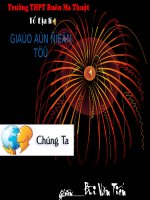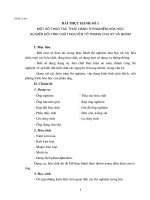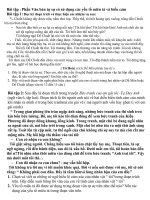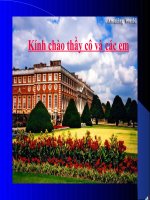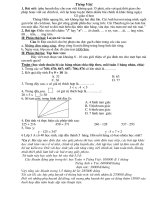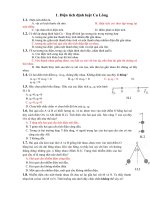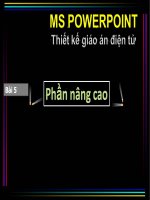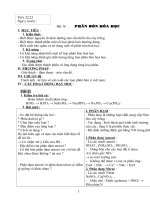Bài Ôn Luyện Nâng Cao 11-12 CB
Bạn đang xem bản rút gọn của tài liệu. Xem và tải ngay bản đầy đủ của tài liệu tại đây (41.93 KB, 2 trang )
CÁC BÀI ÔN LUYỆN HAY
I. Read the passage and decide whether the statements that follow are
true
or
false
.
Weather and People in England
The British have a special saying: "Other countries have a climate. In England we have weather.' People say this
because, in England, one can have four seasons in one day! For example, one day begins as a gentle spring morning. But
an hour later black clouds appear and it rains very hard. At noon, it becomes very cold, like winter perhaps as cold as 8
degrees centigrade. Then, in the late afternoon, the sun shines again and it is like summer. This is not unusual in England
Engjand has almost every kind of weather. Some foreigners think England has dense fog ten months of the year, but this
is not true. We never know vvhat kind of weather well have. This is a problem. We may get several softs of weather in
one day. But we also have some winter days in the middle of summer and vice versa!
The uncertain weather makes Englishmen naturally cautious. A foreigner laughs when he sees an Englishman wearing a
raincoat and carrying an umbrella on a beautiful sunny day. But later when it rains, he will wish he had brought an
umbrella himself! Such changeable weather also makes the British adaptable. Some people say the British could make so
many colonies because the weather everywhere was like some kind of English weather. So Englishmen could easily live
anywhere.
Of course, the weather is a popular topic of conversation in England. Even the most silent Englishman will talk about the
weather. He may complain a great deal about it. But he would never trade it for any other country's climate.
TRUE FALSE
1. The weather in England is always predictable.
2. Sometimes there are some hot days in winter in England.
3. It is very unusual to have four seasons in one day in England.
4. It is wrong to think that England has dense fog ten months of the year.
5. The British are used to different kinds of weather.
6. The British rarely talk about the weather of their country.
7. The British are cautious not to take an umbrella or a raincoat on a sunny day.
II. Choose the most appropriate response (A, B, C, D or E) to complete the dialogue.
Martin
: Are you and Peter going to Jack's party on Sunday?
Bob
: Yes,we are. Why do you ask?
Martin
:
Bob
: Good idea. Let's do that.
A. I wasn't planning to go unless you were going.
B. Oh! I was just wondering.
C. I really wanted to know if Mary was going.
D. I was just interested, that's all.
E. Well, I thought we might buy a present for him together.
III. Choose the best answer (A, B, C, D or E) for the situation.
A friend is showing you photographs he took at your sister's wedding. They are all good, but one particular photo of
your sister is quite perfect. You say in delight:
A. But this is gorgeous. Just look how her happiness shows!
B. Most wedding photographs are too carefully posed.
C. Her wedding dress looks awful in the photograph. Doesn't it?
D. If only it hadn't rained and you could have taken photos in the garden.
E. I wonder what she was laughing at in this photo!
IV. Complete the second sentence so that it means the same as the first sentence.
1. I can't play the guitar as well as he can.
He is a me.
2. Haven't you got any cheaper tickets?
Are those you've got?
3. You talk far more quickly than Julie.
You don't talk Julie.
4. I've never been to a less exciting concert.
It was I've ever been to.
BÀI ÔN LUYỆN HAY~ 1
5. I'd never been so busy before.
I was I'd ever been before.
6. Paul didn't learn English as quickly as I did.
I
7. Mum doesn't speak English as well as Dad.
Dad speaks
8. Cars are faster than buses.
Buses aren't…………………………………………………….
9. There are fewer accidents at traffic lights than at roundabouts.
There aren't
10. Long-distance coaches are less comfortable but cheaper than trains
Trains are
11. In the seventies traffic conditions weren't as bad as they are now.
Now
12. Petrol and diesel vehicles pollute the atmosphere more than electric ones.
Electric vehicles
V. Choose the modal verb which best fits each of the following sentences.
1. You look tired; I think you
should/must/have to
have a rest.
2. You
must/need to/have
to
stop that immediately or I shall get very angry with you.
3. It's the end of term so you
shouldn't/mustn't/don 't have to
do any homework.
4. You
should/ought to/have to
have a licence to drive a car on the roads.
5. I've told you before - you
needn't/mustn't/don't have to
hit your little brother!
6. You
needn't/shouldn't/mustn't
write it all out again if you don't want to.
7. She really
should/must/has got to
take more care but she probably won't.
8. Today's Saturday, so I
oughtn't to/haven't got to/ shouldn't
get up early.
9. It's a fantastic song - you
have to/must/need
to hear it as soon as you can!
10. I
shouldn't/mustn't/don't have to
be telling you this, but she fancies you a lot.
VI. Replace each of the words in
italics
with one of the phrasal verl in the box.
break up - get through - put up - settle down - turn into
1. It's certain that the government will
raise
taxes next year.
2. Somehow we managed to
spend
all our money on the first day of our holiday,
3. I know it's cold and rainy now but I'm sure it's going to
become
a really nice day.
4. If you come to London, I'll be happy to
accommodate
you for the night.
5. After we
finish school
at the end of next week, I'm going to get a part-time job in a supermarket.
6. After the third goal, the crowd stood up and cheered before they
became still
again.
7. I'm sorry to
bring the meeting to an end
, but I've got to leave in five minutes.
KEY
I.
1. False 2. True 3. False 4. True 5. True 6. False 7. False
II. E. Well, I thought we might buy a present for him together.
III. A. But this is gorgeous. Just look how her happiness shows!
IV.
1. He is a better guitarist than me.
2. Are those tickets the cheapest you've got?
3. You don't talk as slowly as Julie.
4. It was the least exciting concert I've ever been to.
5. I was busier than I'd ever been before.
6. I learned English more quickly than Paul did.
7. Dad speaks English better than Mum.
8. Buses aren't as fast as cars.
9. There are more accidents at roundabouts than at traffic lights.
10. Trains are more comfortable and more expensive than Longdistance coaches.
11. Now traffic conditions are worse than they were in the seventies.
12. Electric vehicles don't pollute the atmosphere as much as petrol and diesel vehicles.
V.
1. should 2. must 3. don t have 4. have to 5. mustn't
6. needn't 7. should 8. haven't got to 9. Must 10. don't have to
VI. 1. put up 2. get through 3. turn into 4. put up
5. break up 6. settle down 7. break up
BÀI ÔN LUYỆN HAY~ 2
